The Deeper Thinking Podcast
The Deeper Thinking Podcast The Deeper Thinking Podcast offers a space where philosophy becomes a way of engaging more fully and deliberately with the world. Each episode explores enduring and emerging ideas that deepen how we live, think, and act. We follow the spirit of those who see the pursuit of wisdom as a lifelong project of becoming more human, more awake, and more responsible. We ask how attention, meaning, and agency might be reclaimed in an age that often scatters them. Drawing on insights stretching across centuries, we explore how time, purpose, and thoughtfulness can quietly transform daily existence. The Deeper Thinking Podcast examines psychology, technology, and philosophy as unseen forces shaping how we think, feel, and choose, often beyond our awareness. It creates a space where big questions are lived with—where ideas are not commodities, but companions on the path. Each episode invites you into a slower, deeper way of being. Join us as we move beyond the noise, beyond the surface, and into the depth, into the quiet, and into the possibilities awakened by deeper thinking.
Episodes

Friday Mar 28, 2025
Friday Mar 28, 2025
The Freedom of Enoughness
The Deeper Thinking Podcast
Enoughness begins in the pause we once called failure.
This episode is a meditation on the radical possibility of being enough. In a culture that equates worth with achievement, the quiet act of presence can feel subversive. Drawing from the philosophical insights of Simone Weil and Byung-Chul Han, and the psychological work of Kristin Neff and Abraham Maslow, we explore how enoughness is not mediocrity—but a form of ethical refusal.
Weil writes that attention is a moral act: an undivided presence that suspends self-interest and makes space for what is. Han critiques the violence of positivity and constant self-optimisation. Neff reorients us to self-compassion as an active principle, and Maslow reframes self-actualisation not as conquest, but as congruence with our inner truth. Together, their ideas offer a pathway out of performance culture and into a more inhabitable life.
This is not a rejection of ambition. It is an invitation to examine where striving begins—and whether it serves or obscures us. Enoughness is not stagnation. It is the quiet presence of belonging, without the need to earn it.
What This Offers
A contemplative path out of productivity culture
Insights from philosophy and psychology on presence and worth
Guidance on self-compassion as a form of ethical resistance
A deeper relationship with stillness, slowness, and sufficiency
Listen On:
YouTube
Spotify
Apple Podcasts
Support This Work
If you'd like to support the ongoing work, you can visit buymeacoffee.com/thedeeperthinkingpodcast or leave a kind review on Apple Podcasts.
Bibliography
Byung-Chul Han. The Burnout Society. Translated by Erica B. Buell. Stanford: Stanford University Press, 2015.
Maslow, Abraham. Motivation and Personality. 2nd ed. New York: Harper & Row, 1970.
Neff, Kristin. Self-Compassion: The Proven Power of Being Kind to Yourself. New York: William Morrow, 2011.
Weil, Simone. Gravity and Grace. Translated by Arthur Wills. London: Routledge, 2002.
Tolle, Eckhart. The Power of Now: A Guide to Spiritual Enlightenment. Novato: New World Library, 1999.
Enoughness is not the absence of ambition—it is the quiet presence of belonging.
#Enoughness #Philosophy #Stillness #SimoneWeil #ByungChulHan #SelfCompassion #Maslow #TheDeeperThinkingPodcast
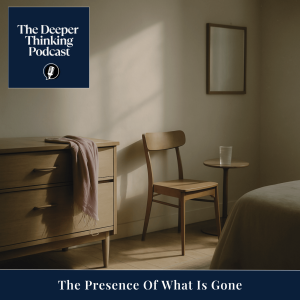
Friday Mar 28, 2025
Friday Mar 28, 2025
The Presence of What is Gone
The Deeper Thinking Podcast
A meditation on memory not as what we remember, but what remains with us—embodied, atmospheric, and unresolved.
Some things don’t leave. They recede, they quiet, they fold into the background—yet their presence lingers. Not as memory in the traditional sense, but as atmosphere. As interruption. As an intimacy that returns without warning. This episode explores memory not as recollection, but as the return of what never fully disappeared. A haunting that is less about ghosts than about gestures. Less about the past than about its insistence on being felt in the present.
We turn to Jacques Derrida, Henri Bergson, and Paul Ricœur to rethink memory: Derrida’s hauntology evokes the presence of absence, Bergson’s durée describes time as qualitative flow, and Ricœur’s narrative identity reframes remembrance as an evolving act of being. Memory is not just archived thought—it’s lived structure, echo, and return.
This is not about supernatural haunting. It’s about the shape of what’s gone and how it outlines the living. A scent, a corridor, a stillness—these are how memory touches us before thought arrives. What we call “haunting” may be a form of care. Or continuity. Or even grace.
Reflections
How does absence remain embodied?
Can memory be understood as architecture?
Is haunting a form of ethical presence?
How do we carry what is no longer ours?
Why Listen?
Rethink memory through sensation, rhythm, and space
Encounter hauntology as a philosophical, not spooky, idea
Learn how narrative identity shapes our experience of time
Hear a poetic, quiet philosophy of what remains
Listen On:
YouTube
Spotify
Apple Podcasts
Support This Work
If you'd like to support the ongoing work, you can visit buymeacoffee.com/thedeeperthinkingpodcast or leave a kind review on Apple Podcasts.
Bibliography
Barthes, Roland. Camera Lucida: Reflections on Photography. Translated by Richard Howard. New York: Hill and Wang, 1981.
Bergson, Henri. Matter and Memory. Translated by N.M. Paul and W.S. Palmer. New York: Zone Books, 1991.
Damasio, Antonio. The Feeling of What Happens: Body and Emotion in the Making of Consciousness. New York: Harcourt, 1999.
Derrida, Jacques. Specters of Marx: The State of the Debt, the Work of Mourning, and the New International. Translated by Peggy Kamuf. London: Routledge, 1994.
Federici, Silvia. Re-enchanting the World: Feminism and the Politics of the Commons. Oakland: PM Press, 2018.
Merleau-Ponty, Maurice. Phenomenology of Perception. Translated by Colin Smith. London: Routledge & Kegan Paul, 1962.
Ricœur, Paul. Memory, History, Forgetting. Translated by Kathleen Blamey and David Pellauer. Chicago: University of Chicago Press, 2004.
What lingers is not what was, but what refused to leave.
#Memory #Hauntology #JacquesDerrida #HenriBergson #PaulRicoeur #Embodiment #Phenomenology #TheDeeperThinkingPodcast
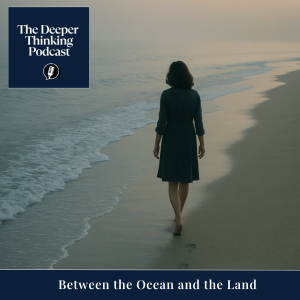
Thursday Mar 27, 2025
Thursday Mar 27, 2025
Between the Ocean and the Land
The Deeper Thinking Podcast
A meditation on ambiguity, borderlands, and the ethics of remaining incomplete.
She walks along the tide line where the maps blur. Where the shore is no longer shore, and the ocean not yet sea. This is not a crossing, but an arrival into something unresolved. Beneath the surface of things that almost become one another, there is a silence that is not empty. A stillness that asks to be heard.
Ambiguity is often treated as something to be resolved. A gap in understanding. A flaw in comprehension. But here, it is understood as environment—an entire perceptual and cultural landscape that asks not to be mastered, but inhabited. In this space, clarity is not the goal. What emerges instead is a form of presence: lucid, incomplete, and essential.
Touch, breath, ritual—these are not metaphors, but epistemologies. Maurice Merleau-Ponty argued that perception is not distant observation, but entanglement. Simone Weil described attention as a moral act—waiting without grasping, perceiving without possession. And in the work of Gloria Anzaldúa, the “borderland” becomes more than geography—it is a condition of knowing, a refusal of coherence imposed from without.
The cognitive discomfort of uncertainty is well documented. The mind’s need for closure is not merely psychological but ancestral. Yet beneath that impulse lies another: the ability to remain. In silence. In paradox. In a space that neither confirms nor denies. It is not a failure of will, but a form of devotion. The tension is real. But so is the possibility.
Not all things can be resolved. Some should not be. The architecture of experience is not always built for conclusion. The world may be more honest when it is allowed to remain unfinished.
Reflections
Some of the questions that surfaced along the way:
What if ambiguity is a location, not a lack?
How do we remain with uncertainty when clarity feels urgent?
Can perception be ethical if it refuses mastery?
What if attention becomes sacred when it doesn’t resolve?
How does the body carry truths that evade language?
Is completion always the right ambition?
Could not-knowing be a form of deep knowing?
Why Listen?
Reframe ambiguity as a generative, ethical condition
Engage with phenomenology, mysticism, and epistemic borderlands
Discover how perception, ritual, and attention become knowing
Explore the philosophical and emotional textures of the unresolved
Listen On:
YouTube
Spotify
Apple Podcasts
Support This Work
If you'd like to support the ongoing work, you can visit buymeacoffee.com/thedeeperthinkingpodcast or leave a kind review on Apple Podcasts.
Bibliography
Merleau-Ponty, Maurice. The Visible and the Invisible. Evanston: Northwestern University Press, 1968.
Weil, Simone. Gravity and Grace. London: Routledge, 2002.
Anzaldúa, Gloria. Borderlands/La Frontera. San Francisco: Aunt Lute Books, 1987.
Haraway, Donna. Staying with the Trouble. Durham: Duke University Press, 2016.
Some truths reveal themselves only in the unfinishing.
#Ambiguity #MerleauPonty #SimoneWeil #GloriaAnzaldúa #Uncertainty #Philosophy #Attention #Perception #Borderlands #DonnaHaraway #TheDeeperThinkingPodcast #Phenomenology #Ethics #NotKnowing
Bibliography Relevance
Maurice Merleau-Ponty: Frames perception as an embodied entanglement with the world, not a detached observation. His work helps reorient ambiguity as an ecological condition—one felt through the skin rather than solved in the mind.
Simone Weil: Describes attention as a sacred, receptive act. In this framework, ambiguity becomes a space for devotion, where truth is allowed to arrive unforced and incompletely.
Gloria Anzaldúa: Introduces the borderland as an epistemic zone of contradiction, hybridity, and transformation. Her concept of “nepantla” supports ambiguity as a generative threshold state, not a crisis of coherence.
Donna Haraway: Advocates for staying with the trouble—remaining within complexity without collapsing it into resolution. Her posthumanist ethics offers a powerful anchor for living inside ambiguity as a relational responsibility.
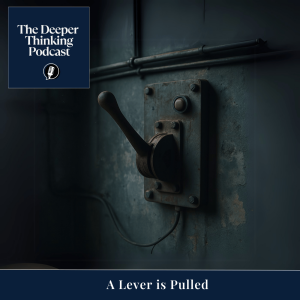
Thursday Mar 27, 2025
Thursday Mar 27, 2025
A Lever Is Pulled
The Deeper Thinking Podcast
A ritual of control. A machine that no longer moves.
There is a gesture repeated in silence that feels like power, even when it does nothing. A switch thrown. A lever pulled. The room responds with flashbulbs. The statement lands like thunder. But the machine remains still. No policy transforms. No system yields. Yet the lever is pulled again.
This episode sits inside that moment. It explores the symbolic afterlife of sovereignty in a globalised economy where rituals of governance persist long after material power has been outsourced, automated, or abstracted. We ask: what does it mean to perform control rather than exercise it? And why does that performance continue to hold emotional weight?
Drawing from Giorgio Agamben’s theory of the exception, Wendy Brown and David Harvey on neoliberal erosion of state autonomy, and Iris Marion Young on diffuse responsibility, we trace the rituals of policy that persist even when causality is broken. Achille Mbembe reminds us that sovereignty was always unevenly distributed—more idea than fact. The result is a theatre of decision: sovereignty re-enacted, not enacted.
Trade wars, Brexit performances, and pandemic logistics all echo through this space—not as ideology, but as infrastructure. The lever becomes a gesture of consolation, not consequence. A story we repeat to avoid the void.
What This Offers
A meditation on the aesthetic of control in a post-sovereign world
Exploration of symbolic governance as ritual rather than function
Philosophical insight into how spectacle replaces authority
A political reflection on what remains when power becomes narrative
Listen On:
YouTube
Spotify
Apple Podcasts
Support This Work
If you'd like to support the ongoing work, you can visit buymeacoffee.com/thedeeperthinkingpodcast or leave a kind review on Apple Podcasts.
Bibliography
Agamben, Giorgio. State of Exception. Translated by Kevin Attell. Chicago: University of Chicago Press, 2005.
Benjamin, Walter. “Theses on the Philosophy of History.” In Illuminations, edited by Hannah Arendt. Translated by Harry Zohn. New York: Schocken Books, 1969.
Bratton, Benjamin H. The Stack: On Software and Sovereignty. Cambridge, MA: MIT Press, 2016.
Brown, Wendy. Undoing the Demos: Neoliberalism’s Stealth Revolution. New York: Zone Books, 2015.
Debord, Guy. The Society of the Spectacle. Translated by Donald Nicholson-Smith. New York: Zone Books, 1994.
Fanon, Frantz. The Wretched of the Earth. Translated by Richard Philcox. New York: Grove Press, 2004.
Foucault, Michel. Society Must Be Defended. Translated by David Macey. New York: Picador, 2003.
Glissant, Édouard. Poetics of Relation. Translated by Betsy Wing. Ann Arbor: University of Michigan Press, 1997.
Haidt, Jonathan. The Righteous Mind. New York: Pantheon Books, 2012.
Harvey, David. Spaces of Global Capitalism. London: Verso, 2006.
Lakoff, George. Moral Politics. Chicago: University of Chicago Press, 2002.
Mbembe, Achille. Necropolitics. Translated by Steven Corcoran. Durham, NC: Duke University Press, 2019.
Mouffe, Chantal. The Democratic Paradox. London: Verso, 2000.
Rey, Hélène. “Dilemma Not Trilemma.” In Jackson Hole Economic Symposium, 2013.
Sassen, Saskia. Expulsions. Cambridge, MA: Harvard University Press, 2014.
Scott, James C. Seeing Like a State. New Haven: Yale University Press, 1998.
Young, Iris Marion. Responsibility for Justice. Oxford: Oxford University Press, 2011.
The lever is still pulled. Not to move the world—but to keep the story from breaking.
#Sovereignty #Philosophy #SymbolicPower #Agamben #Spectacle #Infrastructure #Governance #DeeperThinkingPodcast
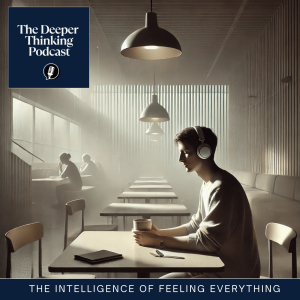
Wednesday Mar 26, 2025
Wednesday Mar 26, 2025
The Intelligence of Feeling Everything
Some perceptions don’t arrive with sound—they shimmer, flicker, echo softly through the body before the mind can name them.
You’re in a café. The world seems still. But someone across the room flinches—not at a crash or a scream, but at the flicker of a fluorescent bulb. The pitch of laughter. The shift in mood before words even catch up. We live in a culture that praises speed, volume, and decisiveness. But what happens to those who feel before they know? Who notice before they speak? What happens to people for whom the world is not simply seen or heard—but registered, metabolized, carried?
Sensitivity, as it’s often framed, is mistaken for fragility. But what if it’s a form of intelligence? A cognitive style adapted for nuance, depth, and relational texture? Drawing from frameworks like Sensory Processing Sensitivity, Mirror Neuron Theory, and Differential Susceptibility, this episode explores the deeper structure of high sensitivity—not as an emotional overreaction, but as a perceptual design. Thinkers like Elaine Aron, Antonio Damasio, and Byung-Chul Han help frame sensitivity as both a neurological pattern and a cultural contradiction—at once a survival trait and a social inconvenience.
But the stakes go deeper than theory. In workplaces, schools, relationships—sensitive people often perform invisible labor. They absorb tension, anticipate needs, soften spaces. Their attention is not loud, but it is constant. And the cost of this attunement, unrecognized, can become a quiet erosion. They are not the loudest voices, but often the most necessary ones. In a world that grows noisier each day, what does it mean to protect the ones who still listen before they speak?
How do we make space for people whose intelligence shows up not in performance, but in perception?
Why Listen?
• What if emotion isn’t the opposite of intelligence—but its foundation?• In a world designed for speed, what happens to those who move through nuance?• Who holds the tension in a room no one names?• What might change if we treated perception itself as a moral act?
Further Reading
As an affiliate, we may earn from qualifying purchases through these links.
📖 The Highly Sensitive Person – The foundational guide to understanding sensory processing sensitivity. 🔗 Amazon affiliate link📖 The Burnout Society by Byung-Chul Han – A critique of overstimulation and cultural acceleration. 🔗 Amazon affiliate link📖 The Feeling of What Happens by Antonio Damasio – On emotion as central to consciousness and self. 🔗 Amazon affiliate link📖 Quiet by Susan Cain – A portrait of the power of the inward and reflective. 🔗 Amazon affiliate link📖 Parable of the Sower by Octavia Butler – A speculative look at empathic survival in a fractured world. 🔗 Amazon affiliate link
Support Us
https://www.buymeacoffee.com/thedeeperthinkingpodcast
🎧 Listen On:🔹 YouTube🔹 Spotify🔹 Apple Podcasts
Abstract
This essay explores high sensitivity not as a psychological weakness, but as a cognitive, emotional, and evolutionary strategy rooted in sensory processing sensitivity (SPS). Through a reflective and culturally situated lens, it reframes sensitivity as a form of perceptual intelligence—characterized by deep processing, environmental attunement, and empathic resonance. Drawing on frameworks from neuroscience, philosophy of mind, behavioral ecology, and cultural criticism, the essay challenges dominant narratives that pathologize sensitivity, especially within capitalist, overstimulated societies. The work positions highly sensitive individuals as vital outliers whose ways of knowing often go unrecognized but are essential for social coherence and ethical depth. By integrating the theories of Elaine Aron, Antonio Damasio, Miranda Fricker, Byung-Chul Han, and others, the essay situates sensitivity as a site of epistemic injustice, emotional labor, and quiet resistance. The piece concludes by calling for new cultural architectures that support, rather than suppress, this underacknowledged cognitive style.
Bibliography (APA 7th Edition)
Aron, E. N. (1996). The highly sensitive person: How to thrive when the world overwhelms you. Broadway Books.
Aron, E. N., & Aron, A. (1997). Sensory-processing sensitivity and its relation to introversion and emotionality. Journal of Personality and Social Psychology, 73(2), 345–368. https://doi.org/10.1037/0022-3514.73.2.345
Belsky, J., & Pluess, M. (2009). Beyond diathesis stress: Differential susceptibility to environmental influences. Psychological Bulletin, 135(6), 885–908. https://doi.org/10.1037/a0017376
Boyce, W. T., & Ellis, B. J. (2005). Biological sensitivity to context: I. An evolutionary–developmental theory of the origins and functions of stress reactivity. Development and Psychopathology, 17(2), 271–301. https://doi.org/10.1017/S0954579405050145
Damasio, A. R. (1999). The feeling of what happens: Body and emotion in the making of consciousness. Harcourt.
Fricker, M. (2007). Epistemic injustice: Power and the ethics of knowing. Oxford University Press.
Han, B.-C. (2015). The burnout society (E. Butler, Trans.). Stanford University Press. (Original work published 2010)
Hochschild, A. R. (1983). The managed heart: Commercialization of human feeling. University of California Press.
Kagan, J. (1994). Galen's prophecy: Temperament in human nature. Basic Books.
Turkle, S. (2011). Alone together: Why we expect more from technology and less from each other. Basic Books.
Wolf, M., van Doorn, G. S., Leimar, O., & Weissing, F. J. (2008). Life-history trade-offs favour the evolution of animal personalities. Nature, 451(7184), 581–584. https://doi.org/10.1038/nature06560
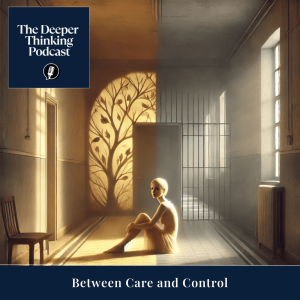
Wednesday Mar 26, 2025
Wednesday Mar 26, 2025
Between Care and Control
What if healing was also a kind of obedience?
A figure sits in silence at the edge of a softly lit corridor. Not confined, but not quite free. There is a weight in their stillness, a pause between movements—as if they are waiting to understand which parts of themselves are welcome in the world beyond the door. This is not a story of illness, not even a story of recovery. It’s the quiet tension that sits between the two: the subtle negotiation between being known and being reshaped.
We speak easily of mental health now—more openly, more frequently—but often with a language inherited from institutions and histories we’ve only half-examined. What does it mean to care, really? To offer help without insisting on conformity? In this episode, we slow down to consider the fine line between support and surveillance, between relational healing and moral conditioning. It is a line that thinkers like G.W.F. Hegel saw as fertile ground for freedom—distress as an intelligible call for reconnection. But also a line that Michel Foucault feared was ripe for coercion—where the hand that soothes is also the hand that disciplines.
Throughout the episode, we explore how these frameworks reverberate through contemporary mental health care. We draw on Frantz Fanon, whose writings on psychiatry and colonialism remain piercingly relevant, and Thomas Szasz, whose critiques of diagnostic authority still challenge us to question who holds the power to name suffering. Even bell hooks, though writing in a different register, reminds us that love and care—when practiced with depth—resist domination. Against this backdrop, we also confront the institutional legacies of figures like Philippe Pinel, whose celebrated compassion may have masked subtler instruments of control.
This isn’t a polemic, but a meditation. On what we inherit. On how easily the desire to help can become a mandate to reform. And on the quieter question: who gets to define what it means to be well?
Why Listen?
• When care becomes indistinguishable from conformity• When freedom and treatment speak different dialects• When distress reveals what society cannot absorb• What does it mean to heal without disappearing?
Further Reading
As an affiliate, we may earn from qualifying purchases through these links.
📖 Madness and Civilization by Michel Foucault – A haunting genealogy of psychiatric power.🔗 Amazon affiliate link
📖 The Myth of Mental Illness by Thomas Szasz – A provocative challenge to the foundations of psychiatry.🔗 Amazon affiliate link
📖 The Wretched of the Earth by Frantz Fanon – On colonization, trauma, and the politicization of the mind.🔗 Amazon affiliate link
📖 All About Love by bell hooks – An invitation to reimagine care as radical freedom.🔗 Amazon affiliate link
Abstract
This audio essay interrogates the blurred boundaries between care and control within contemporary mental health practices. By exploring the tension between healing and obedience, it asks whether acts of care—particularly in institutional contexts—can unintentionally reproduce systems of conformity and discipline. Drawing on thinkers such as Michel Foucault, Frantz Fanon, Thomas Szasz, and bell hooks, the piece traces how historical and philosophical frameworks continue to shape our understanding of psychological well-being. It reflects on how the desire to help can subtly evolve into a mandate to normalize, raising the unsettling question: who determines what it means to be well? Through a careful blend of narrative and theory, the episode challenges listeners to reconsider the ethics of treatment, the politics of naming suffering, and the quiet pressures that underlie our most intimate forms of care.
Bibliography (Chicago Style)
Fanon, Frantz. The Wretched of the Earth. Translated by Richard Philcox. New York: Grove Press, 2004.
Foucault, Michel. Madness and Civilization: A History of Insanity in the Age of Reason. Translated by Richard Howard. New York: Vintage Books, 1988.
hooks, bell. All About Love: New Visions. New York: William Morrow Paperbacks, 2001.
Szasz, Thomas. The Myth of Mental Illness: Foundations of a Theory of Personal Conduct. New York: Harper & Row, 1974.
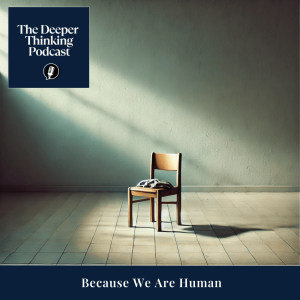
Monday Mar 24, 2025
Monday Mar 24, 2025
Because We Are Human
A young woman sits alone in her car outside a grocery store, not because she’s shopped, but because she’s trying to find the right words to ask strangers to save her life. Her illness is not new. What’s new is that she has no insurance. No job. No safety net. She’s been told she needs surgery—and now, she’s being told she has to make it persuasive. Choose the right photo. Write a compelling story. Make people believe. In that moment, she is no longer a person in pain. She is a pitch. And that is the world many of us live in—one where survival is a performance.
This episode does not open with answers. It opens with a tension: the moral weight of need in a world that sorts the worthy from the unworthy. We follow that thread into a deeper question—what would change if we began not with scarcity, but with dignity? If needs weren’t treated as evidence of failure, but as universal entitlements?
Through the ideas of Immanuel Kant, who defined dignity as intrinsic and non-negotiable, and Hannah Arendt, who warned us about what happens when people are stripped of the “right to have rights,” we explore how systems encode beliefs about human worth. The episode is shaped by the moral clarity of James Baldwin and the spiritual severity of Simone Weil, who both called us to recognize suffering not as failure, but as a mirror. And we pause in a moment of history when this moral vision was real—when nations tried to build dignity into the structure of daily life.
What remains today is not just policy, but memory. Memory of a promise: that no one should have to qualify for care. That dignity isn’t something you earn—it’s something you protect. This is not a story of utopia. It’s a quiet reminder: we’ve done this before. We’ve built systems that began with the belief that to be human is enough.
There are nations where being alive once meant something more than being useful. Where a person could be poor, or sick, or still—and still be given what they needed. Not out of pity. Not out of charity. But because, at some point, there was agreement: the human fact was enough. Being free means free from these crippling fears. It might be difficult to imagine walking into a hospital and being asked nothing. No identification. No insurance. Just a name, perhaps, or not even that. This the foundations of the health care in most of Europe for over 70 years.
Beneath this architecture was an idea neither new nor naïve. The moral language of Immanuel Kant, filtered through war and ruin, had become civic scaffolding: the belief that each person held a value beyond use, a dignity that could not be weighed against budget lines or public sentiment. It echoed again in the Universal Declaration of Human Rights, where shelter, medicine, and education were named not as goals, but as rights. The echo still rings, though faintly, through hollowed-out institutions and automated voices asking callers to please hold.
A chair appears. Worn, wooden, back straight. Sometimes in a hospital corridor, sometimes at the edge of a benefits office. Always empty. Always waiting. The chair does not belong to a single person; it is not marked or numbered. It is for whoever arrives next. A gesture, not of luxury, but of readiness. One could build an entire ethics around that: a chair that waits not for the right person, but the next one. everyone in need.
Further Reading
As an affiliate, we may earn from qualifying purchases through these links.
📖 The Second Sex by Simone de Beauvoir – A foundational text on recognition and embodied dignity.🔗 Amazon affiliate link
📖 The Human Condition by Hannah Arendt – On visibility, voice, and what it means to appear in the world.🔗 Amazon affiliate link
📖 The Fire Next Time by James Baldwin – A moral reckoning with power, poverty, and dignity.🔗 Amazon affiliate link
📖 Gravity and Grace by Simone Weil – Mystical, severe, and morally demanding reflections on affliction.🔗 Amazon affiliate link
📖 The Idea of Justice by Amartya Sen – On fairness, freedom, and the real-world application of justice.🔗 Amazon affiliate link
Abstract
This essay explores the moral architecture of dignity in modern society, tracing the quiet erosion of systems that once provided universal care without condition. Using postwar Britain as a historical lens, it reflects on the philosophical legacy of Immanuel Kant and the practical implementation of his ethical ideals in public institutions like the NHS, public housing, and education. Through recurring imagery and cultural memory, the essay questions how dignity was operationalized, how it was lost, and what remains of it in contemporary policy. It suggests that dignity, once designed into daily life, now lingers as both memory and moral imperative. The essay avoids polemic, instead offering a reflective meditation on readiness, worth, and the quiet violence of conditional care.
Bibliography
Arendt, Hannah. The Human Condition. Chicago: University of Chicago Press, 1958.
Baldwin, James. The Fire Next Time. New York: Dial Press, 1963.
Kant, Immanuel. Groundwork for the Metaphysics of Morals. Translated by Mary Gregor. Cambridge: Cambridge University Press, 1998.
Sen, Amartya. The Idea of Justice. Cambridge, MA: Belknap Press, 2009.
United Nations. Universal Declaration of Human Rights. Paris: United Nations General Assembly, 1948. https://www.un.org/en/about-us/universal-declaration-of-human-rights
Weil, Simone. Gravity and Grace. Translated by Emma Craufurd. London: Routledge, 1952.
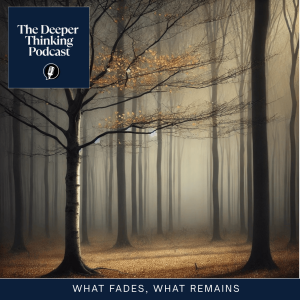
Monday Mar 24, 2025
Monday Mar 24, 2025
What Fades, What Remains
The Deeper Thinking Podcast
A meditation on the soft ache of staying, even as the self begins to vanish.
A tree, nearly bare, stands at the edge of a cold grey field. The leaves are almost gone. No spectacle. Just one or two, still held, not clinging—simply not yet released. This isn’t collapse. It’s not grief. It’s the discipline of retreat. The space between presence and absence, when something within begins to step back, quietly, rhythmically, without explanation.
In a culture of constant output, what happens when someone stops arriving fully? The body still shows up. The voice still answers. But something steps back. Not in pain. Not in protest. Simply in stillness. A tiredness with no origin. A quiet without a wound.
Vanishing is often mistaken for absence. But it may be presence reshaped—a thinning, not a rupture. One can still perform, still smile, still be admired—while the weight within lightens beyond recognition. Dimming is not failure. It is sometimes survival.
Composure becomes costume. Gesture becomes code. The world applauds what it can measure, and so the illusion holds. Praise often arrives at the very moment someone has disappeared most completely. Stillness is read as strength. Disappearance, as dignity.
The philosopher Henri Bergson described time as durée—not a sequence, but a thickened pool of lived experience. Within that time, presence becomes atmosphere, not anchor. The light shifts. A name slips. A thread catches. What remains is sensation. And the sensation does not argue. It just stays.
To speak of this requires a different language. One that doesn’t persuade, but remain. Wittgenstein wrote, “Whereof one cannot speak, thereof one must be silent.” But even silence can be misunderstood. It is often read as distance when it is, in fact, an offering.
The philosopher Emmanuel Levinas called it the ethics of the face—to appear is to be responsible. And to fade, even gently, may leave someone else holding that weight. But this episode does not accuse. It stays. It watches. It names nothing. The breath continues. The leaf almost falls. The ache is not solved—it is seen.
What This Offers
A lyrical reflection on emotional thinning and the ethics of quiet
Insight into seasonal retreat, silence, and non-performative presence
Engagement with the works of Bergson, Levinas, Weil, Han, and Wittgenstein
A dignified space for those who feel themselves slowly vanishing
Listen On:
YouTube
Spotify
Apple Podcasts
Support This Work
If you'd like to support the ongoing work, you can visit buymeacoffee.com/thedeeperthinkingpodcast or leave a kind review on Apple Podcasts.
Bibliography
Bergson, Henri. Time and Free Will: An Essay on the Immediate Data of Consciousness. New York: Dover Publications, 2001.
Levinas, Emmanuel. Totality and Infinity: An Essay on Exteriority. Pittsburgh: Duquesne University Press, 1969.
Weil, Simone. Gravity and Grace. London: Routledge, 2002.
Wittgenstein, Ludwig. Tractatus Logico-Philosophicus. London: Routledge, 1922.
Han, Byung-Chul. The Burnout Society. Stanford: Stanford University Press, 2015.
This is not absence. It is another way of remaining.
#EmotionalWithdrawal #Presence #Bergson #Levinas #SimoneWeil #Stillness #Wittgenstein #TheDeeperThinkingPodcast
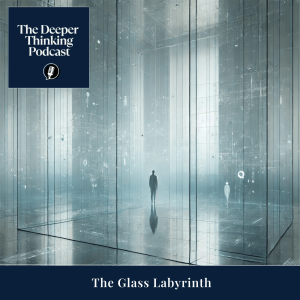
Monday Mar 24, 2025
Monday Mar 24, 2025
The Glass Labyrinth
The Deeper Thinking Podcast
The invisible architecture of choice and control.
You’ve scrolled the feed a hundred times, each tap an echo of your own reflection—and yet, the path was not yours to begin with. This episode explores the quiet disappearance of autonomy in a world where freedom is not taken, but shaped. Not by coercion, but by invisible design. The labyrinth is not a maze with an exit; it is a transparent system that feels like freedom while guiding you softly toward a predetermined goal.
We engage thinkers like Michel Foucault, Shoshana Zuboff, and Hannah Arendt to trace how contemporary power is embedded not in the state or law, but in the interfaces we mistake for mirrors. Algorithms do not restrain—they predict, shape, and learn. Arendt reminds us how normalization erodes judgment, until action becomes indistinguishable from obedience.
This is not a warning about surveillance. It is an inquiry into how desire itself is conditioned—how our preferences are pre-empted, our values inferred, and our resistance quietly rerouted. In the age of ambient control, the labyrinth is not where we are lost, but where we believe we’ve found ourselves. Every step feels chosen. That is the design.
What This Offers
This episode offers not an alarm, but an attunement—a way to begin seeing what’s been shaping us all along.
A philosophical reflection on predictive design and autonomy
Exploration of invisible systems shaping behavioral choice
Engagement with Foucault, Zuboff, and Arendt on power, freedom, and perception
A meditation on how control persists through familiarity and frictionlessness
Listen On:
YouTube
Spotify
Apple Podcasts
Support This Work
If you'd like to support the ongoing work, you can visit buymeacoffee.com/thedeeperthinkingpodcast or leave a kind review on Apple Podcasts.
Bibliography
Arendt, Hannah. The Human Condition. Chicago: University of Chicago Press, 1958.
Carr, Nicholas. The Shallows: What the Internet Is Doing to Our Brains. New York: W. W. Norton & Company, 2010.
Foucault, Michel. Discipline and Punish: The Birth of the Prison. Translated by Alan Sheridan. New York: Vintage Books, 1995.
Zuboff, Shoshana. The Age of Surveillance Capitalism. New York: PublicAffairs, 2019.
Stiegler, Bernard. Automatic Society: The Future of Work. Cambridge: Polity Press, 2016.
The walls are clear. The guidance is gentle. The question was never how to escape. It was whether we ever truly chose the path at all.
#TheGlassLabyrinth #Autonomy #Foucault #Zuboff #Arendt #SurveillanceCapitalism #Freedom #Design #Philosophy #DeeperThinkingPodcast
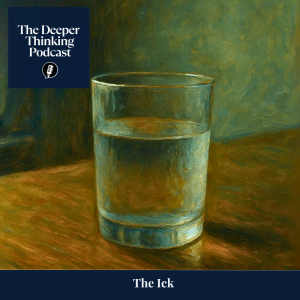
Sunday Mar 23, 2025
Sunday Mar 23, 2025
The Ick
The Deeper Thinking Podcast
A philosophical reflection on repulsion, perception, and the fragility of intimacy.
The moment always feels smaller than its consequences. A glance too long. A laugh pitched just above comfort. A scent of overripe fruit. The ick doesn’t begin as betrayal—it arrives as texture. It is the grain against attraction, the shiver in familiarity. It arises not from distance, but from unbearable closeness. The body knows before the mind forms meaning.
We engage Jean-Paul Sartre’s idea of mauvaise foi—bad faith—as a collapse of the narratives we tell ourselves to make others bearable. The ick doesn’t arise from deceit, but from the crumbling of our carefully curated illusions. Simone de Beauvoir reminds us that love, at its core, is the will to see another as free. But freedom, when misaligned with our expectations, becomes frightening.
Carl Jung proposed that what we reject in others is what we deny in ourselves. The ick, then, may not be about them at all. It may be the sudden emergence of our own shadow—reflected in the clumsy earnestness or too-honest laughter of someone who no longer flatters our story. Perhaps this is not judgment, but self-recognition made intolerable. Or perhaps we are simply cruel—and intimacy is camouflage for a deeper instinct: to flee before being seen.
What begins as closeness ends in surveillance. What begins as attention ends in suffocation. A mispronounced word. A clink of cutlery. The angle of a smile. A breath too fast. The room’s humidity. A door closes. Nothing changed. But we did.
Why Listen?
Understand the emotional structure of the ick and its existential roots
Explore Sartre, Beauvoir, Jung, and Moshfegh on discomfort, intimacy, and perception
Reflect on how authenticity often disturbs rather than deepens connection
Reframe repulsion not as failure, but as a mirror of self-confrontation
Further Reading
The Ethics of Ambiguity by Simone de Beauvoir – On freedom, ambiguity, and our responsibility in how we perceive others.
My Year of Rest and Relaxation by Ottessa Moshfegh – A darkly comic exploration of self-perception, withdrawal, and aversion.
Eternal Sunshine of the Spotless Mind (2004) – Love remembered, rewritten, and undone by the mind’s recoil from discomfort.
Listen On:
YouTube
Spotify
Apple Podcasts
Support This Work
If you'd like to support the ongoing work, you can visit buymeacoffee.com/thedeeperthinkingpodcast or leave a kind review on Apple Podcasts.
Bibliography (Chicago Style)
Beauvoir, Simone de. The Ethics of Ambiguity. Translated by Bernard Frechtman. New York: Citadel Press, 1976.
Jung, Carl. The Undiscovered Self. Translated by R. F. C. Hull. Princeton: Princeton University Press, 1990.
Moshfegh, Ottessa. My Year of Rest and Relaxation. New York: Penguin Press, 2018.
Sartre, Jean-Paul. Being and Nothingness. Translated by Hazel E. Barnes. New York: Washington Square Press, 1993.
Relevance
Simone de Beauvoir: Illuminates the tension between intimacy and freedom—key to understanding the ick as collapse of projected love.
Jean-Paul Sartre: Offers a vocabulary for the existential breakdown of narrative selves, especially in romantic closeness.
Carl Jung: Positions the ick as a mirror of unacknowledged shadow, lending emotional depth to its origin.
Ottessa Moshfegh: Examines the repulsion of unfiltered selfhood through aesthetic and psychological detachment.
What is the cost of truly seeing another? And when the veil lifts, do we really desire to?
#TheIck #Philosophy #Sartre #Beauvoir #Jung #Intimacy #Aversion #DeeperThinkingPodcast #Authenticity #Repulsion #SelfPerception #NarrativeCollapse









